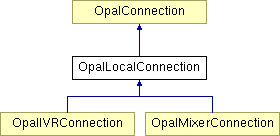
#include <localep.h>
Inheritance diagram for OpalLocalConnection:

Public Member Functions | |
Construction | |
| OpalLocalConnection (OpalCall &call, OpalLocalEndPoint &endpoint, void *userData, unsigned options, OpalConnection::StringOptions *stringOptions, char tokenPrefix= 'L') | |
| ~OpalLocalConnection () | |
Overrides from OpalConnection | |
| virtual PBoolean | IsNetworkConnection () const |
| virtual PBoolean | SetUpConnection () |
| virtual PBoolean | SetAlerting (const PString &calleeName, PBoolean withMedia) |
| virtual PBoolean | SetConnected () |
| virtual OpalMediaStream * | CreateMediaStream (const OpalMediaFormat &mediaFormat, unsigned sessionID, PBoolean isSource) |
| virtual OpalMediaStreamPtr | OpenMediaStream (const OpalMediaFormat &mediaFormat, unsigned sessionID, bool isSource) |
| virtual PBoolean | SendUserInputString (const PString &value) |
New operations | |
| virtual void | AlertingIncoming () |
| virtual void | AcceptIncoming () |
Member variable access | |
| void * | GetUserData () const |
| Get user data pointer. | |
| void | SetUserData (void *v) |
| Set user data pointer. | |
Protected Attributes | |
| OpalLocalEndPoint & | endpoint |
| void * | userData |
| OpalLocalConnection::OpalLocalConnection | ( | OpalCall & | call, | |
| OpalLocalEndPoint & | endpoint, | |||
| void * | userData, | |||
| unsigned | options, | |||
| OpalConnection::StringOptions * | stringOptions, | |||
| char | tokenPrefix = 'L' | |||
| ) |
Create a new connection.
| call | Owner call for connection |
| endpoint | Owner endpoint for connection |
| userData | Arbitrary data to pass to connection |
| OpalLocalConnection::~OpalLocalConnection | ( | ) |
Destroy connection.
| virtual void OpalLocalConnection::AcceptIncoming | ( | ) | [virtual] |
Accept the incoming connection.
| virtual void OpalLocalConnection::AlertingIncoming | ( | ) | [virtual] |
Indicate alerting for the incoming connection.
| virtual OpalMediaStream* OpalLocalConnection::CreateMediaStream | ( | const OpalMediaFormat & | mediaFormat, | |
| unsigned | sessionID, | |||
| PBoolean | isSource | |||
| ) | [virtual] |
Open a new media stream. This will create a media stream of an appropriate subclass as required by the underlying connection protocol. For instance H.323 would create an OpalRTPStream.
The sessionID parameter may not be needed by a particular media stream and may be ignored. In the case of an OpalRTPStream it us used.
Note that media streams may be created internally to the underlying protocol. This function is not the only way a stream can come into existance.
The default behaviour is pure.
| mediaFormat | Media format for stream |
| sessionID | Session number for stream |
| isSource | Is a source stream |
Reimplemented from OpalConnection.
Reimplemented in OpalIVRConnection, and OpalMixerConnection.
| void* OpalLocalConnection::GetUserData | ( | ) | const [inline] |
Get user data pointer.
| virtual PBoolean OpalLocalConnection::IsNetworkConnection | ( | ) | const [inline, virtual] |
Get indication of connection being to a "network". This indicates the if the connection may be regarded as a "network" connection. The distinction is about if there is a concept of a "remote" party being connected to and is best described by example: sip, h323, iax and pstn are all "network" connections as they connect to something "remote". While pc, pots and ivr are not as the entity being connected to is intrinsically local.
Implements OpalConnection.
Reimplemented in OpalIVRConnection.
| virtual OpalMediaStreamPtr OpalLocalConnection::OpenMediaStream | ( | const OpalMediaFormat & | mediaFormat, | |
| unsigned | sessionID, | |||
| bool | isSource | |||
| ) | [virtual] |
Open source or sink media stream for session.
| mediaFormat | Media format to open |
| sessionID | Session to start stream on |
| isSource | Stream is a source/sink |
Reimplemented from OpalConnection.
| virtual PBoolean OpalLocalConnection::SendUserInputString | ( | const PString & | value | ) | [virtual] |
Send a user input indication to the remote endpoint. This sends an arbitrary string as a user indication. If DTMF tones in particular are required to be sent then the SendIndicationTone() function should be used.
The default behaviour plays the DTMF tones on the line.
| value | String value of indication |
Reimplemented from OpalConnection.
Reimplemented in OpalIVRConnection.
| virtual PBoolean OpalLocalConnection::SetAlerting | ( | const PString & | calleeName, | |
| PBoolean | withMedia | |||
| ) | [virtual] |
Indicate to remote endpoint an alert is in progress. If this is an incoming connection and the AnswerCallResponse is in a AnswerCallDeferred or AnswerCallPending state, then this function is used to indicate to that endpoint that an alert is in progress. This is usually due to another connection which is in the call (the B party) has received an OnAlerting() indicating that its remote endpoint is "ringing".
The default behaviour does nothing.
| calleeName | Name of endpoint being alerted. |
| withMedia | Open media with alerting |
Implements OpalConnection.
| virtual PBoolean OpalLocalConnection::SetConnected | ( | ) | [virtual] |
Indicate to remote endpoint we are connected.
The default behaviour sets the phase to ConnectedPhase, sets the connection start time and then checks if there is any media channels opened and if so, moves on to the established phase, calling OnEstablished().
In other words, this method is used to handle incoming calls, and is an indication that we have accepted the incoming call.
Reimplemented from OpalConnection.
| virtual PBoolean OpalLocalConnection::SetUpConnection | ( | ) | [virtual] |
Start an outgoing connection. This function will initiate the connection to the remote entity, for example in H.323 it sends a SETUP, in SIP it sends an INVITE etc.
The default behaviour does.
Implements OpalConnection.
| void OpalLocalConnection::SetUserData | ( | void * | v | ) | [inline] |
Set user data pointer.
OpalLocalEndPoint& OpalLocalConnection::endpoint [protected] |
void* OpalLocalConnection::userData [protected] |
 1.4.7
1.4.7